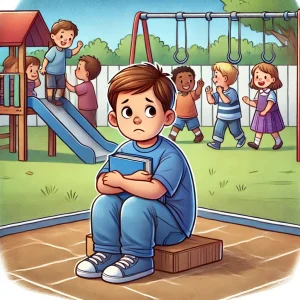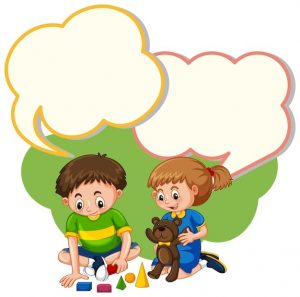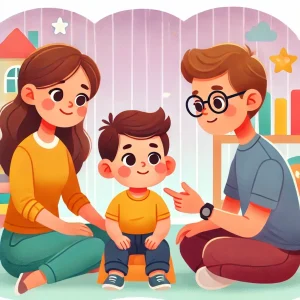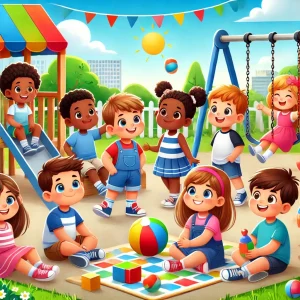Articulation and Its Impact on Early Language Skills in Kids
By Wellness Hub
Last Updated: December 10, 2024
Every word your child utters is a stepping stone in their journey of language development. From their very first “mama” or “dada,” to the complete sentences they’ll soon form, each phase is crucial. But what ensures they progress from single sounds to full sentences? The answer lies largely in one critical skill: articulation.
Articulation, or the ability to form clear and precise sounds, is the cornerstone of effective communication. It’s not just about clarity of speech; it’s about the ability to connect with others and express thoughts. In the early years, this skill plays a pivotal role not only in language development but also in social interactions and academic success. When children articulate well, they convey their ideas and emotions more effectively, which boosts their confidence and eagerness to communicate.
Also read: Speak Clearly and Learn: Master Articulation Skills
Understanding Articulation in Early Language Development
What is Articulation?
Articulation is the process by which sounds are formed when your tongue, lips, jaw, and other speech organs come together to produce recognizable speech. It’s more than just making noise; it’s about crafting distinct sounds that can be strung together to form words and sentences. When we talk about a child’s articulation, we’re referring to how clearly they make these sounds. Are the “s” sounds sharp and clear? Can the “r” roll off their tongue correctly? These are indicators of good articulation.
Articulation is a fundamental skill that serves as the building blocks of speech. Without it, even basic communication could be hindered, affecting a child’s ability to interact with the world around them.
Also read: Articulation Disorder in Children: Signs, Causes & Treatment
Why Articulation Matters for Early Language Skills
Clear articulation is more than just a skill for eloquent speech; it’s crucial for effective communication. When children articulate words clearly, they’re not only understood more easily by others, but they also gain the ability to understand spoken language better themselves. This two-way street of understanding is essential for language development.
Clear articulation aids in the development of phonological awareness—an understanding of how language works at the sound level, which is a critical precursor to reading. Children who can articulate well are often more skilled in rhyming, segmenting sounds in words, and recognizing patterns in language, all of which are foundational skills for literacy.
The Impact of Articulation on Early Childhood Language Skills
How Articulation Affects Speech Clarity
Articulation is crucial for clear speech in children. When kids articulate well, they pronounce their sounds clearly, making their words easy to understand. This clarity is important because it helps children learn new words and communicate effectively. If every sound is clear, children can more easily pick up differences in similar words, like “cat” and “cap,” which is crucial for their language development.
Good articulation also means children get better feedback when they talk. If adults and other kids can understand them, they’ll respond appropriately, which encourages children to keep talking and improving.
Problems Caused by Poor Articulation
When children can’t articulate sounds clearly, it might lead to several challenges:
- Slower Language Development: Kids who struggle with clear speech might learn to talk and use language later than others.
- Social Issues: It can be hard for children to make friends or play with others if their speech isn’t clear. This might make them feel left out or upset.
- Trouble at School: Difficulty with clear speech can also make it hard for kids to do well in school, especially in reading and writing.
- Ongoing Speech Problems: If these articulation issues aren’t addressed, they might turn into more serious speech disorders that need treatment from a speech therapist.
Identifying Articulation Issues in Children
Common Signs of Articulation Problems
Recognizing early signs of articulation issues in children can prevent long-term speech difficulties. Here are some indicators that a child may be experiencing articulation problems:
- Unclear Speech: If a child’s speech is consistently difficult to understand compared to other children of the same age, it might indicate an articulation issue.
- Omitting Sounds: Children who frequently leave out sounds in words (saying “ca” instead of “cat”) may have articulation difficulties.
- Distorting Sounds: Instead of clear sounds, the child produces altered or distorted sounds that are hard to recognize.
- Substituting Sounds: This involves replacing one sound with another, such as saying “wabbit” for “rabbit.”
- Frustration When Speaking: If a child shows signs of frustration or avoids talking because they struggle to articulate, it’s often a red flag.
These signs can vary widely, and some children might exhibit one or more of these issues. It’s important to note how often these occur and whether they improve over time.
When to Seek Help for Articulation Concerns
Knowing when to seek help from a speech-language pathologist can make a significant difference in a child’s communication skills. Consider consulting a professional if:
- Lack of Improvement: If there’s no noticeable improvement in articulation as the child grows.
- Social or Academic Impact: When articulation issues affect a child’s ability to interact with peers or succeed in school.
- Increased Frustration: If the child becomes increasingly upset about speaking or starts avoiding speaking situations.
- Advice from Teachers or Caregivers: Educators or caregivers who express concerns about the child’s speech clarity or development.
Enhancing Articulation to Boost Language Development
Techniques to Improve Articulation in Toddlers
Helping your toddler articulate better can be fun and effective with these simple techniques:
- Mirror Exercises: Sit with your toddler in front of a mirror. Say sounds and words slowly and clearly, encouraging your child to watch both your mouth and their own.
- Sing Songs: Singing is great for learning sounds. Choose simple nursery rhymes and emphasize each word as you sing together.
- Read Aloud: Reading to your child helps them hear how words are pronounced. Pick books with rhymes or repeated phrases to practice certain sounds.
- Play Articulation Games: Make a game of speaking clearly. For example, say a word before blowing a bubble or taking a turn in a game.
- Practice During Daily Activities: Use everyday moments to practice sounds. For example, focus on the ‘s’ sound when sipping soup or the ‘m’ sound when making meals.
These activities are not just helpful but also strengthen your bond with your child by spending fun, productive time together.
Role of Speech Therapy in Articulation Improvement
If your child continues to struggle with articulation, speech therapy might be necessary. Here’s how it helps:
- Tailored Exercises: Speech therapists create exercises specifically for your child’s needs, making sure they are both fun and effective.
- Use of Technology: Therapists often use apps and software to keep sessions engaging. These can provide instant feedback and help maintain your child’s interest.
- Monitoring Progress: Speech therapists regularly check your child’s progress and adjust methods as needed to ensure the best outcomes.
- Guidance for Parents: Therapists also teach you exercises to do at home, helping you play an active role in your child’s improvement.
Conclusion:
Good articulation is key to your child’s early language development. It helps them express themselves clearly and boosts their confidence. Keep an eye on how your child speaks and encourage their progress. Simple activities and expert help can make a big difference! Looking for tips and tools to improve your child’s speech? Visit Wellness Hub for resources and guidance. Help your child speak clearly and confidently. Start today and see the difference!
Frequently Asked Questions:
1. What is articulation in early language development?
Articulation refers to the way sounds are formed and pronounced using the mouth, lips, tongue, and throat. In early language development, clear articulation is critical as it helps children learn how to pronounce words correctly, which is essential for effective communication and language skills.
2. Why is clear articulation important for kids?
Clear articulation is crucial because it ensures that a child can be easily understood by others. This clarity in speech supports better communication, enhances social interactions, and aids in academic success as clear speech is closely linked to reading and writing abilities.
3. At what age should a child’s speech become clear?
By the age of 4, most children’s speech should be clear and understandable to an unfamiliar listener. If clarity isn’t achieved by this age, it might indicate that the child has articulation difficulties. Parents should monitor their child’s speech development milestones and consult a professional if there are concerns.
4. What are common signs of articulation problems in children?
Signs of articulation problems may include difficulty pronouncing certain sounds, omitting sounds from words, substituting different sounds (like saying “wabbit” instead of “rabbit”), and frustration or avoidance when speaking. These signs should be taken seriously, especially if they persist beyond the expected age for speech clarity.
5. How can I help improve my child’s articulation?
Improving a child’s articulation can be supported through regular practice. Engage your child in activities such as singing nursery rhymes, reading stories aloud, and playing sound games that emphasize clear pronunciation. Repetition and positive reinforcement are key in helping children refine their speech.
6. What does a speech therapist do to help with articulation?
A speech therapist assesses a child’s speech patterns and identifies specific articulation challenges. They then use targeted exercises and therapeutic techniques tailored to the child’s needs, which may include mouth exercises, practicing sounds, and using digital tools to provide visual feedback and interactive learning experiences.
7. When should I seek help for my child’s articulation issues?
If your child’s speech is not improving with age, or if they show signs of struggle such as frustration or consistent mispronunciation of sounds, it may be time to consult a speech-language pathologist. Early intervention is key to effectively addressing articulation issues.
8. Can poor articulation affect my child’s academic performance?
Yes, poor articulation can impact a child’s ability to learn to read and write. Speech clarity is closely linked to phonetic awareness, which is crucial for decoding words and spelling. If a child struggles with articulation, they might also struggle with these academic skills.
9. Are there online resources for improving articulation in kids?
Numerous online platforms, including WellnessHub, offer resources such as interactive games, instructional videos, and downloadable exercises designed to help children with articulation. These resources can be used at home to supplement professional speech therapy or as part of regular speech practice.
10. How long does it take to correct articulation problems?
The duration required to correct articulation problems varies depending on the severity of the issue and the child’s responsiveness to intervention. While some improvements can be noticed within a few months, more significant or complex issues may take longer. Consistent practice and professional guidance are essential for effective improvement.
About the Author:
Rajini Darugupally
M.Sc., Speech-Language Pathologist (9+ years of experience)
Rajini is a passionate and dedicated Speech-Language Pathologist with over 9+ years of experience, specializing in both developmental speech and language disorders in children and rehabilitation in adults. Currently, at Wellness Hub, she thrives in a team environment that values innovation, compassion, and achieving results for their clients.
Book your Free Consultation Today
Parent/Caregiver Info:
Client’s Details:
* Error Message









